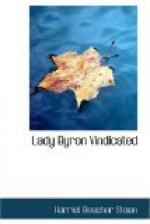’Ever yours most affectionately,
‘A. I. BYRON.’
We observe in this letter that it is written to be shown to Lady Byron’s father, and receive his sanction; and, as that father was in ignorance of all the deeper causes of trouble in the case, it will be seen that the letter must necessarily be a reserved one. This sufficiently accounts for the guarded character of the language when speaking of the causes of separation. One part of the letter incidentally overthrows Lord Byron’s statement, which he always repeated during his life, and which is repeated for him now; namely, that his wife forsook him, instead of being, as she claims, expelled by him.
She recalls to Lord Byron’s mind the ’desire and determination he has expressed ever since his marriage to free himself from its bondage.’
This is in perfect keeping with the ‘absolute desire,’ signified by writing, that she should leave his house on the earliest day possible; and she places the cause of the separation on his having ‘too painfully’ convinced her that he does not want her—as a wife.
It appears that Augusta hesitates to show this note to her brother. It is bringing on a crisis which she, above all others, would most wish to avoid.
In the meantime, Lady Byron receives a letter from Lord Byron, which makes her feel it more than ever essential to make the decision final. I have reason to believe that this letter is preserved in Lady Byron’s papers:—
’Feb. 4, 1816.
’I hope, my dear A., that you would on no account withhold from your brother the letter which I sent yesterday in answer to yours written by his desire, particularly as one which I have received from himself to-day renders it still more important that he should know the contents of that addressed to you. I am, in haste and not very well,
’Yours most affectionately,
‘A. I. BYRON.’
The last of this series of letters is less like the style of Lady Byron than any of them. We cannot judge whether it is a whole consecutive letter, or fragments from a letter, selected and united. There is a great want of that clearness and precision which usually characterised Lady Byron’s style. It shows, however, that the decision is made,—a decision which she regrets on account of the sister who has tried so long to prevent it.




